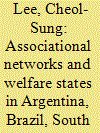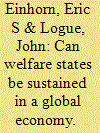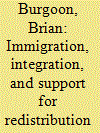|
|
|
Sort Order |
|
|
|
Items / Page
|
|
|
|
|
|
|
| Srl | Item |
| 1 |
ID:
114498


|
|
|
|
|
| Publication |
2012.
|
| Summary/Abstract |
This article investigates the structures of civic networks and their roles in steering the political choices of party and union elites regarding the retrenchment or expansion of welfare states in four recently democratized developing countries. Utilizing coaffiliation networks built upon two waves of World Values Surveys and evidence from comparative case studies for Argentina, Brazil, South Korea, and Taiwan, the study develops two explanatory factors that account for variations in welfare politics: cohesiveness and embeddedness. In Argentina and, to a lesser degree, in Taiwan, party and union leaders' cohesive relationships, being disarticulated from the informal civic sphere, allowed them to conduct elite-driven social policy reforms from above, by launching radical neoliberal reforms (Argentina) or by developing a generous transfer-centered welfare state (Taiwan). In Brazil and South Korea, however, party and union leaders' durable solidarity embedded in wider civic communities enabled them to resist the retrenchment of welfare states (Brazil) or implement universal social policies (South Korea) based on bottom-up mobilization of welfare demands. This article demonstrates that elites in the formal sector make markedly different political choices when confronting economic crisis and democratic competition depending upon their organizational connections in formal and informal civic networks.
|
|
|
|
|
|
|
|
|
|
|
|
|
|
|
|
| 2 |
ID:
096156


|
|
|
|
|
| Publication |
2010.
|
| Summary/Abstract |
Argue that the European social model can be reformed without sacrificing its gains and that the Scandinavian states have already adapted their welfare state models to meet demographic, social, and economic challenges. They sketch the characteristics of the Scandinavian model, including its underpinnings in encompassing organizations of the less well off, the role of democratic corporatism in policymaking, and the importance of empiricism, social trust, and solidarity in the development of public policy.
|
|
|
|
|
|
|
|
|
|
|
|
|
|
|
|
| 3 |
ID:
156836


|
|
|
|
|
| Summary/Abstract |
Comparative research on Latin American welfare states recently has focused on the extension of non-contributory benefits to those outside the formal labor market. This extension of benefits constitutes a major break from past exclusionary welfare regimes. Yet there also are substantial areas of continuity, especially in the contributory social-insurance system that absorbs most of welfare budgets. We develop here a framework for studying changes in Latin American welfare states that reconciles these trends. We argue that Latin American governments enjoyed an “easy” stage of welfare expansions in the 2000s, characterized by distinct political coalitions. Bottom-targeted benefits could be layered on top of existing programs and provided to wide segments of the population. But many Latin American governments are nearing the exhaustion of this social-policy model. We explore policy and coalitional challenges that hinder moves to “hard” redistribution with case studies of unemployment insurance in Chile and housing in Colombia.
|
|
|
|
|
|
|
|
|
|
|
|
|
|
|
|
| 4 |
ID:
132505


|
|
|
|
|
| Publication |
2014.
|
| Summary/Abstract |
Immigration poses individual or collective economic risks that might increase citizen support for government redistribution, but it can also generate fiscal pressure or undermine social solidarity to diminish such support. These offsetting conditions obscure the net effects of immigration for welfare states. This article explores whether immigration's effects are mediated by the economic and social integration of immigrants. Integration can be conceptualized and measured as involving the degree to which immigrants suffer unemployment rates, depend on welfare-state benefits, and harbor social attitudes similarly to the native population. Such integration may alter how immigration reduces solidarity and imposes fiscal and macroeconomic pressures, but does not much alter how immigration spurs economic risks for natives. Where migrants are more integrated by such measures, immigration should have less negative or more positive implications for native support for government redistribution and welfare states than where migrants are less integrated. The article explores these arguments using survey data for twenty-two European countries between 2002 and 2010. The principal finding is that economic integration, more than sociocultural integration, softens the tendency of immigration to undermine support for redistributive policies.
|
|
|
|
|
|
|
|
|
|
|
|
|
|
|
|
| 5 |
ID:
074556


|
|
|
|
|
| Publication |
2006.
|
| Summary/Abstract |
The power resources approach, underlining the relevance of socioeconomic class and partisan politics in distributive conflict within capitalist economies, is challenged by employer-centered approaches claiming employers and cross-class alliances to have been crucial in advancing the development of welfare states and varieties of capitalism. Theoretically and empirically these claims are problematic. In welfare state expansion, employers have often been antagonists, under specific conditions consenters, but very rarely protagonists. Well-developed welfare states and coordinated market economies have emerged in countries with strong left parties in long-term cabinet participation or in countries with state corporatist institutional traditions and confessional parties in intensive competition with left parties.
|
|
|
|
|
|
|
|
|
|
|
|
|
|
|
|
|
|
|
|
|